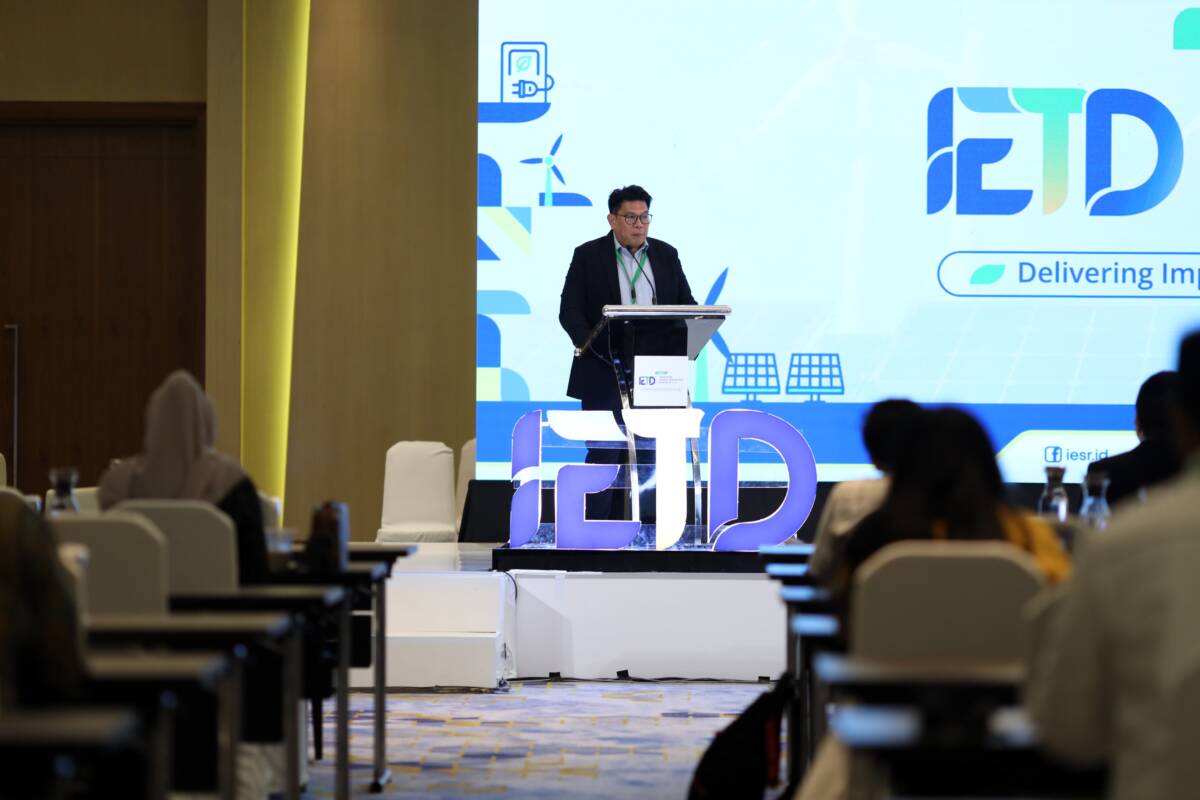Jakarta, October 8, 2025 – Indonesia has developed a roadmap for its electricity sector energy transition to achieve the net zero emissions (NZE) target by 2060 or sooner, as stipulated in Ministerial Regulation No. 10/2025. The push to develop an energy transition roadmap was also echoed by the Indonesia Clean Energy Forum (ICEF) and the Institute for Essential Services Reform (IESR) at the 2024 Indonesia Energy Transition Dialogue (IETD). Through the updated National Energy Policy (KEN) in Government Regulation No. 40/2025, the government targets a renewable energy mix of 19-23 percent by 2030, with a gradual increase to 70-72 percent by 2060. However, the IESR and ICEF, in the 2025 IETD, considered the renewable energy mix target to be relatively low compared to Indonesia’s renewable energy potential of over 3,600 GW.
ICEF and IESR encourage careful, structured planning and appropriate strategies to accelerate the achievement of the renewable energy mix target, even reaching 100 percent by 2050, exceeding the target set in the KEN. To this end, ICEF and IESR recommend three main strategies, encompassing short-, medium-, and long-term strategies, for the 2025 Indonesia Energy Transition Dialogue (IETD). The 2025 Indonesia Energy Transition Dialogue (IETD), organized by the Institute for Essential Services Reform (IESR) and the Indonesia Clean Energy Forum (ICEF), with support from the British Embassy Jakarta through the Green Energy Transition Indonesia (GETI) project, took place in Jakarta on the third day (October 8, 2025).
In the short term, there are three strategies that can be implemented in the next one to two years. First, integrate the 100 GW solar and distributed battery program into the renewable energy-based village economic development plan. This plan needs to be outlined in a strong regulation (Presidential Decree or Presidential Regulation). Second, increase the rooftop solar power quota to encourage industry, community, and public participation in the energy transition. Third, implement the Transmission Network Sharing (PBJT) concept to expand access to renewable energy for industry.
Fabby Tumiwa, Chief Executive Officer (CEO) of the Institute for Essential Services Reform (IESR), stated that the implementation of PBJT will create a mutually beneficial environment for the government, industry, the public, and PLN (State Electricity Company). This step can increase the national renewable energy mix without burdening the state budget, increasing PLN’s revenue and network utilization. Furthermore, the implementation of PBJT can improve the quality of electricity supply for communities near renewable energy projects and maintain industrial competitiveness by reducing the carbon footprint of manufacturing. Furthermore, the implementation of the 100 GW program can make Indonesia a model for implementing an energy transition for developing countries that are growing the solar and battery supply chain industry.
“The government needs to establish an institutional framework that will develop a detailed implementation plan for the 100 GW distributed solar power plant program, with a clear division of roles for all ministries/agencies and stakeholders involved. The program implementation plan must ensure opportunities to create demand for solar energy, driving the development of a domestic industrial supply chain. Furthermore, education and training programs must be developed to prepare a workforce for the solar energy sector and for sectors that drive rural economic growth, such as agriculture, fisheries, the creative industry, and MSMEs,” said Fabby.
In the medium term, over the next three to four years, the IETD recommends six strategies to create enabling conditions for accelerating the energy transition to achieve maximum impact. First, strengthen education, public participation, and trust to support the energy transition program, including the 100 GW distributed solar power plant program, thereby fostering public trust, support, and participation. Second, prepare regulations that make renewable energy projects feasible and bankable. The licensing and preparation process for renewable energy projects must be designed to minimize project development risks, reduce the cost of funds, and increase bankability. Third, align financial instruments and carbon markets to achieve clear targets and roadmaps. Fourth, improve electricity system operations and enhance the capacity of electricity sector stakeholders to anticipate the need for massive renewable energy integration. Fifth, mainstream knowledge and skills related to green jobs into education and training systems.
Sripeni Inten Cahyani, a member of ICEF, emphasized the importance of the roles of relevant ministries, such as the National Development Planning Agency (Bappenas), the Ministry of Manpower, and the Ministry of Higher Education, Science, and Technology, in identifying competitive needs and mainstreaming education and training in industrial sectors that will grow from the energy transition process.
Sixth, the creation of a green hydrogen ecosystem based on affordable electricity prices, technological mastery and efficiency, and the gradual establishment of a green hydrogen ecosystem. One way to achieve this is by providing incentives to these priority sectors to create hydrogen demand.
Meanwhile, in the long term, IETD 2025 encourages the government to ensure leadership in the energy transition process by creating a strong legal foundation to provide certainty and consistency in long-term energy transition policies.
“The energy transition requires a long and targeted transformation process, necessitating a solid and sustainable foundation. Therefore, during President Prabowo’s administration, it is necessary to align policies and planning for energy, development, and climate change. Several laws related to the energy transition, such as the New and Renewable Energy Law and the Electricity Law, need to be accelerated to support quick wins and the enabling conditions that have been established,” explained Sripeni Inten.
The Indonesia Energy Transition Dialogue (IETD) 2025 is the eighth IETD since its inauguration in 2018. IETD 2025 took place from October 6-8 with the theme “Delivering Impactful Energy Transition.”

